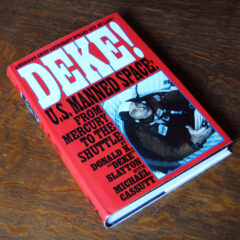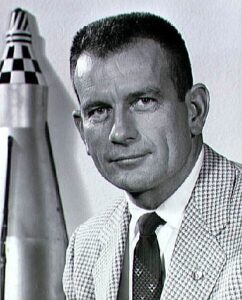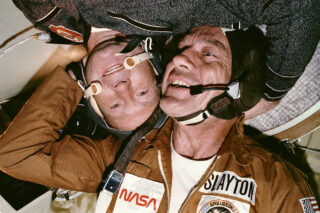
Donald K. “Deke” Slayton may not be the household name he should be, but he has had a hand in shaping history as we have come to know it. He was one of the original Mercury Seven, unfortunately, he was the one who didn’t get a flight, but he did eventually make it into space, and in the meantime, he ran the Astronaut Office, and the story for how he got there, his impressions, his knowledge, perspective, and his stories, are second to none. All of this is what makes Deke! worth your time.
This isn’t my first astronaut autobiography or even my first NASA autobiography as I have previously read quite the who’s who from the golden age of American spaceflight, but Deke, who’s name is mentioned within everyone has a unique perspective because he was passed over, for far too long, but he didn’t stop contributing and he didn’t give up hope of that elusive flight that came thirteen years later.
While most of these types of autobiographies do need to be taken with a grain of salt, this one seems to be at best sparingly self-congratulatory, in fact, it might be one of the more realistic in terms of the portrayal of not only it’s main subject, but NASA as a whole.
Deke doesn’t hero-worship. While he has his friends in and among the Mercury Seven, and NASA as a whole, he doesn’t give them any more than they deserve, which from reading this and other books, seems to be why Deke is so highly regarded among his peers, despite the rest of the world not really giving him the same notoriety as say, Shepherd, Grissom, or Glenn.
The only part of the book that even comes close to self-congratulations, is actually contradicted later in the book. The book’s first paragraph reads:
“I guess when it comes to space and aviation, I’ve seen and done a lot in fifty years. My name isn’t the first one to come to mind when somebody says the word astronaut, but I was one of the original Mercury guys–the one who got screwed out of a mission for medical reasons. I hung in there and wound up running the Astronaut Office. Neil Armstong became the first person to walk on the moon because I selected him. I eventually got into space, however, on Apollo-Soyuz–thirteen years after I should have.”
 But later on he goes on to write “people would talk about this process as if it were some kind of science. Or as if politics had controlled it–the fact that Neil was a civilian. All I can say is that a lot of factors, most of them beyond anybody’s control, put these three guys in the right place at the right time.”
But later on he goes on to write “people would talk about this process as if it were some kind of science. Or as if politics had controlled it–the fact that Neil was a civilian. All I can say is that a lot of factors, most of them beyond anybody’s control, put these three guys in the right place at the right time.”
However, what I find most interesting from the book is the two things that set this apart for me. First, Deke does explain who some thought the first man on the Moon should be and second he details more of what the Soviet Union was doing, during the timeline than any other book I’ve read that isn’t focused on that part of the Space Race.
That first one, who should have been first on the moon?
“One thing that would probably have been different if Gus had lived: the first guy to walk on the moon would have been Gus Grissom, not Neil Armstrong. . .Bob Gilruth and headquarters and I agreed on one thing, prior to the Apollo fire: if possible, one of the Mercury astronauts would have the first chance at being first on the moon…. And at that time Gus was the one guy from the original seven who had the experience to press on through to the landing.”
This is the first I’ve heard of that, but it makes perfect sense to me, but my knowledge is limited to what I have read, and at best, I’m not an expert.
Also, there are some brilliant little quips in this book that are honest to make the early astronauts and even test pilots seem more like cowboys.
- There’s an awful lot of just pure horseshit luck in flying. By the time a pilot gets to the test pilot level, if nothing else, he’s proved he’s lucky.
- Everybody asks pilots, who’s the best one you ever saw? Of course, the right question to ask any pilot is, who’s the second best pilot you ever saw?
- Looking back, I’m amazed at the amount of drinking and flying we did. Part of it was just that it was the thing everybody did. Being the age we were, we could get away with it . . . just like we could get away with flying without G-suits, which happened frequently. It wasn’t as though we were exercise fanatics or anything like that. I might run a little, just to stay in some kind of shape, but I don’t know anyone who had a real exercise program. In some ways, it’s a miracle we survived.
- While I thought the Lovelace physical examinations were excessive, I could at least see the point. But the idea behind all these so-called “stress” tests at Wright-Patterson escaped me completely. I’d flown combat missions and done operational and test flying for seventeen years by that point, like just about everybody else in the process. The fact that we had survived should have told them all they needed to know about stress. What were they supposed to learn from hooking me up to an idiot machine with flashing lights? Or asking me what I saw on a blank piece of paper? Or baking me in a chamber to 130 degrees? At least by putting me in a blackout chamber they let me catch a nap.

Slayton with Leonov during Apollo Soyuz
One other thing worth mentioning is that there is a running series of “Other Voices” throughout this book that color the story from other perspectives around Deke. Some of them include Marie Slayton Madsen, Kent Slayton, Bob Drew, Thomas McElmurry, John Glenn, Walt Williams, James Webb, Thomas Stafford, James McDivitt, Dr. Charles Berry, Alexei Leonov, and Gene Cernan to name a few.
Those names absolutely add color commentary to an already colorful personality and story. Deke Slayton may be one of the oft-forgotten Mercury Seven, but he’s a massive part of the NASA legacy and had a very large impact assisting NASA in getting to the Moon within Kennedy’s deadline.
This book is probably my favorite, just edging out Michael Collins’ Carrying the Fire which I absolutely loved as well.